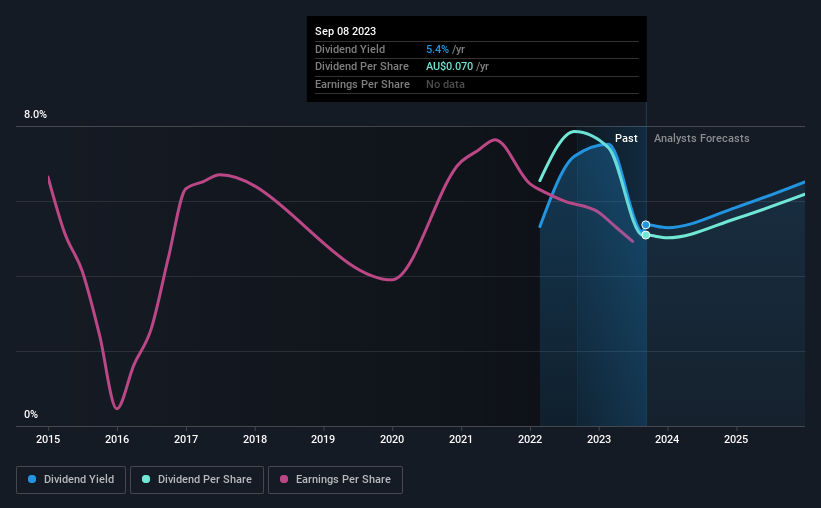Pepper Money (ASX:PPM) Is Paying Out Less In Dividends Than Last Year
Pepper Money Limited's (ASX:PPM) dividend is being reduced from last year's payment covering the same period to A$0.035 on the 12th of October. The dividend yield of 5.4% is still a nice boost to shareholder returns, despite the cut.
View our latest analysis for Pepper Money
Pepper Money's Earnings Easily Cover The Distributions
Impressive dividend yields are good, but this doesn't matter much if the payments can't be sustained. However, prior to this announcement, Pepper Money's dividend was comfortably covered by both cash flow and earnings. This means that most of what the business earns is being used to help it grow.
EPS is set to fall by 3.6% over the next 12 months. If the dividend continues along the path it has been on recently, we estimate the payout ratio could be 35%, which is comfortable for the company to continue in the future.
Pepper Money Doesn't Have A Long Payment History
Without a track record of dividend payments, we can't make a judgement on how stable it has been. This doesn't mean that the company can't pay a good dividend, but just that we want to wait until it can prove itself.
Pepper Money Could Grow Its Dividend
Given that the track record hasn't been stellar, we really want to see earnings per share growing over time. Pepper Money has impressed us by growing EPS at 8.1% per year over the past three years. Growth in EPS bodes well for the dividend, as does the low payout ratio that the company is currently reporting.
Our Thoughts On Pepper Money's Dividend
Even though the dividend was cut this year, we think Pepper Money has the ability to make consistent payments in the future. The payout ratio looks good, but unfortunately the company's dividend track record isn't stellar. Taking all of this into consideration, the dividend looks viable moving forward, but investors should be mindful that the company has pushed the boundaries of sustainability in the past and may do so again.
It's important to note that companies having a consistent dividend policy will generate greater investor confidence than those having an erratic one. Meanwhile, despite the importance of dividend payments, they are not the only factors our readers should know when assessing a company. To that end, Pepper Money has 2 warning signs (and 1 which is significant) we think you should know about. Is Pepper Money not quite the opportunity you were looking for? Why not check out our selection of top dividend stocks.
Have feedback on this article? Concerned about the content? Get in touch with us directly. Alternatively, email editorial-team (at) simplywallst.com.
This article by Simply Wall St is general in nature. We provide commentary based on historical data and analyst forecasts only using an unbiased methodology and our articles are not intended to be financial advice. It does not constitute a recommendation to buy or sell any stock, and does not take account of your objectives, or your financial situation. We aim to bring you long-term focused analysis driven by fundamental data. Note that our analysis may not factor in the latest price-sensitive company announcements or qualitative material. Simply Wall St has no position in any stocks mentioned.

 Yahoo Finance
Yahoo Finance 
